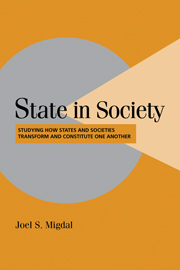Book contents
- Frontmatter
- Contents
- Acknowledgments
- Part I Introduction
- Part II Rethinking Social and Political Change
- 2 A MODEL OF STATE-SOCIETY RELATIONS
- 3 STRONG STATES, WEAK STATES: POWER AND ACCOMMODATION
- Part III A Process-Oriented Approach: Constituting States and Societies
- Part IV Linking Micro- and Macro-Level Change
- Part V Studying the State
- Bibliography
- Index
- Titles in the series
2 - A MODEL OF STATE-SOCIETY RELATIONS
Published online by Cambridge University Press: 05 September 2012
- Frontmatter
- Contents
- Acknowledgments
- Part I Introduction
- Part II Rethinking Social and Political Change
- 2 A MODEL OF STATE-SOCIETY RELATIONS
- 3 STRONG STATES, WEAK STATES: POWER AND ACCOMMODATION
- Part III A Process-Oriented Approach: Constituting States and Societies
- Part IV Linking Micro- and Macro-Level Change
- Part V Studying the State
- Bibliography
- Index
- Titles in the series
Summary
Introduction: Images of the Impact of State on Society
The incredibly quick unraveling of empire in Asia and Africa following World War II suggested to many the hidden political strength of poor, subjugated peoples. Daring leadership, such as that of Mohandas Gandhi, Kwame Nkrumah, and Gamal Abdul Nasser, together with imaginative political organization, such as that found in India's Congress, Algeria's National Liberation Front (FLN), and the Vietnamese Communist party, could topple the rich and powerful. An imperial state could be reduced to a Gulliver among the Lilliputians. Even to third-world leaders who eluded fiery anticolonial struggles, events in distant India or Algeria lent confidence about the important role that centralized, mobilizing politics could play in their countries after independence.
Western imperial powers were not only the bêtes noires in the transition from colony to statehood; they were models to be emulated as well. The aims of the founders of new states were taken largely from already successful states and the dominant European nationalist ideologies of the nineteenth century. New political leaders of Asia and Africa came to believe, like leaders in the West and the socialist bloc, in their states' potential to shape their societies – to move their economies from agriculture to industry, to create a skilled workforce, and to induce the population to abandon outmoded beliefs. Even in Latin America, where many state organizations were exceedingly weak and corrupt throughout the 1950s, a new “can-do” spirit gripped many who aspired to state leadership and to the creation of an effective bureaucratic state organization.
- Type
- Chapter
- Information
- State in SocietyStudying How States and Societies Transform and Constitute One Another, pp. 41 - 57Publisher: Cambridge University PressPrint publication year: 2001



